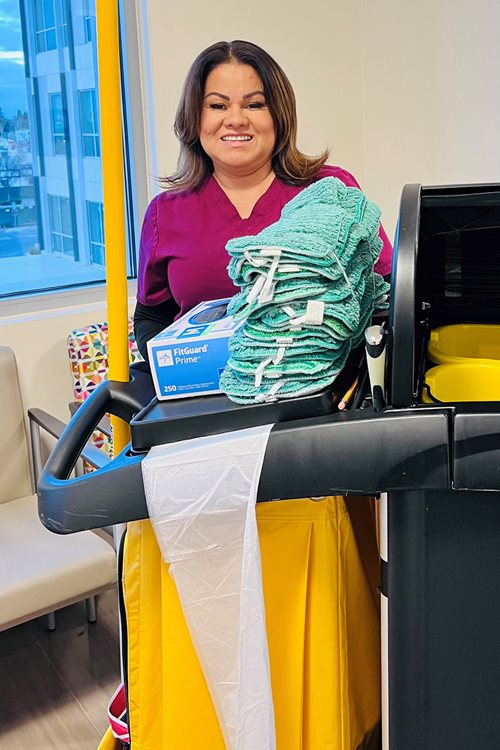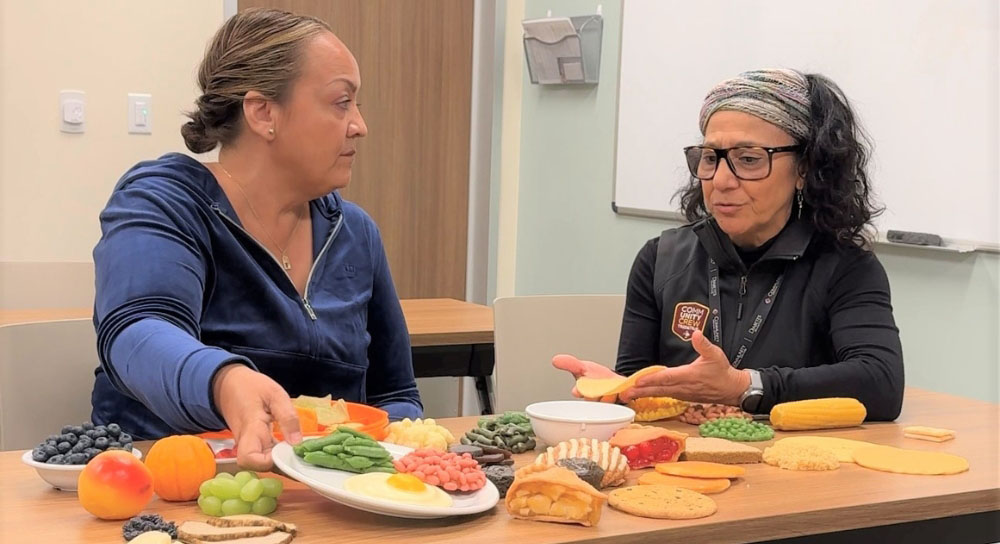Jessica Lopez loves helping people and had dreamed of becoming a nurse, but she worried it might be too late in life to start a healthcare career. She also wasn’t sure how to juggle schooling, her full-time job as an environmental service tech at Community Regional Medical Center, and home life as a busy wife and mom of four.
 Her hopes were answered by a new Community Health System program that pays employees to go to class, do hands-on training for 4 ½ weeks and then take a California state exam to become a certified nurse assistant.
Her hopes were answered by a new Community Health System program that pays employees to go to class, do hands-on training for 4 ½ weeks and then take a California state exam to become a certified nurse assistant.
“I thought, ‘I’m already too old to do it’. But my daughter said, ‘Mom, it’s never too late to do what you want and follow your dream,’” Lopez shared. Her 25-year-old daughter Dammares had just become a registered nurse and assured Lopez, “You will love it!”
“I have been waiting for this opportunity,” Lopez said. “I was surprised because I never thought that I could have that at my work, on the job. I was looking to do it outside of my job … but then I see, wow they give you the opportunity here so we can grow in this company.”
First step to a career caring for patients
Community partnered with Pacific Health Education to start the certified nurse assistant (CNA) training program to help employees who might not have the resources to become a nurse — and to help fill positions in its hospitals and skilled nursing facility. The training program is one of several ways Community encourages employees to further their career, including nursing scholarships, tuition and professional certification reimbursements, and online professional development classes. The first class of 15 Community employees starts March 6.
While in the trainee program, employees will work under the direction of a registered nurse (RN) or licensed vocational nurse (LVN) to do basic care such as changing bed linens, helping patients bathe or shower, handing out meals, changing bandages and other tasks that don't require full CNA certification. They’ll also help with simple patient charting for things like fluid intake. Trainees will split time between online and in-person classes and spend 100 or more hours shadowing clinical staff.
Once nursing assistant trainees finish their schooling and intern period, and pass the state certification, they’ll be hired for CNA positions at Community and also be qualified to work as patient care technicians (PCT) in the hospitals.
For Kathalina Lee, 22, this program is the nudge she needed to get back on track with the college work she started. “I thought about majoring in nursing when I was in college,” explained Lee, “but I always felt nervous about the fears I have of needles and bandages.”
She took a break from her college kinesiology classes and has been working nights at Community Regional as a transporter, moving patients from rooms to radiology or other parts of the hospital. When she saw the employee notice in her email about the new training program, “I thought maybe I should just test this out and see if this career works for me. Then I’ll go back to school and change my major to nursing.”
Growing up watching her mother take care of her grandparents, then a disabled uncle and elderly neighbors as part of Fresno County’s In-Home Support Services program, encouraged Lee to think about a healthcare career. “Just seeing her doing that inspired me to look at what more there is beyond home health,” Lee said.
After working in the hospital, she’s even more inspired by the nurses around her: “Every day is a new thing and the nurses I work with at night are really nice about answering any questions and sometimes they talk to me about what they are doing with their patients. Those kinds of things excite me.”
Providing a path out of poverty for some
While the inaugural class was open only to employees, the hope is to eventually open slots in future classes to those out in the community, said Carla Milton, Community’s Chief Human Resources Officer. “We see this program as a way to encourage our employees to grow their careers with us, but also as a way to provide a step up for many in our greater community,” Milton said.
Improving the economic stability of people in the region has been identified as one of the top health needs in the Valley. Community serves a region with higher rates of poverty and unemployment than the rest of California with the median household income here nearly 39% lower than the statewide median income. Poverty affects access to healthcare, safe housing, education and childcare.
Lopez has only been working in environmental services for about 18 months at Community and was pleased to find out that the health system also provides free Basic Life Skills classes, a requirement for applicants of the nursing assistant training program. And she’s reading ahead in the coursework sent to her early.
She’ll soon be joining her 18-year-old son as a CNA. He did training while in high school and is working as a nursing assistant while taking college classes to become a nurse like his older sister.
“I’m so excited,” Lopez said. “When you start at the bottom, it’s all opportunities ahead I see…You maybe say, ‘Oh I’ll be doing housekeeping for a long time,’ but in reality you might have another opportunity open. I think this is my opportunity to move on and I love it.”





